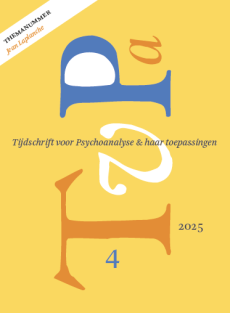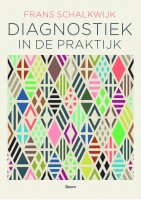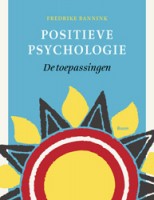Hoe (on)vrij is een associatie van psychoanalytici?
Summary
This paper begins with a case which illustrates the problem of psychoanalytic societies not wanting to know. The case is interpreted using Bions ideas about the relationship between the individual and the group. This leads to an exploration of mainly two questions.
The first concerns the consequences of psychoanalytic societies having to function without geniuses, and the hypothesis is made that psychoanalytic societies turn a blind eye to those consequences. The second question concerns the consequences of psychoanalytic societies unwilling to accept that they are and ought to be only the slaves of the formula for psychoanalysis inspired by Humes famous dictum that reason is and ought to be only the slave of the passions.
Literatuur
- Bion, W.R. (1970), Attention & Interpretation. Karnac Maresfield Reprints, Londen, 1984.
- Fonagy, P., H. Kächele, R. Krause E. Jones en R. Perron (1998), An open door review of outcome studies in psychoanalysis. Report prepared by the Research Committee of the IPA at the request of the president. Internet, http://www.ipa.org.uk/research/complete.htm.
- Freud, S. (1911), Psychoanalytische opmerkingen over een autobiografisch beschreven geval van paranoia (dementia paranoides), (Het geval Schreber). Sigmund Freud Nederlandse Editie: Ziektegeschiedenissen 4. Boom, Meppel, p. 9-96.
- Herrmann, F. (2001), The training analysis at a time when theory is in short supply. International Journal of Psycho-Analysis 82, p. 57-69.
- Kernberg, O.F. (1996), Thirty methods to destroy the creativity of psychoanalytic candidates. International Journal of Psycho-Analysis 77, p. 1031-1040.
- Laing, R.D., D.G. Cooper (1964), Reason and violence, a decade of Sartres philosophy-1950-1960. Tavistock, Londen.
- Vassali, G. (2001), The birth of psychoanalysis from the spirit of technique. International Journal of Psycho-Analysis 82, p. 3-25.
 © 2009-2026 Uitgeverij Boom Amsterdam
© 2009-2026 Uitgeverij Boom Amsterdam
ISSN 1382-516x
De artikelen uit de (online)tijdschriften van Uitgeverij Boom zijn auteursrechtelijk beschermd. U kunt er natuurlijk uit citeren (voorzien van een bronvermelding) maar voor reproductie in welke vorm dan ook moet toestemming aan de uitgever worden gevraagd:
Behoudens de in of krachtens de Auteurswet van 1912 gestelde uitzonderingen mag niets uit deze uitgave worden verveelvoudigd, opgeslagen in een geautomatiseerd gegevensbestand, of openbaar gemaakt, in enige vorm of op enige wijze, hetzij elektronisch, mechanisch door fotokopieën, opnamen of enig andere manier, zonder voorafgaande schriftelijke toestemming van de uitgever.
Voor zover het maken van kopieën uit deze uitgave is toegestaan op grond van artikelen 16h t/m 16m Auteurswet 1912 jo. Besluit van 27 november 2002, Stb 575, dient men de daarvoor wettelijk verschuldigde vergoeding te voldoen aan de Stichting Reprorecht te Hoofddorp (postbus 3060, 2130 KB, www.reprorecht.nl) of contact op te nemen met de uitgever voor het treffen van een rechtstreekse regeling in de zin van art. 16l, vijfde lid, Auteurswet 1912.
Voor het overnemen van gedeelte(n) uit deze uitgave in bloemlezingen, readers en andere compilatiewerken (artikel 16, Auteurswet 1912) kan men zich wenden tot de Stichting PRO (Stichting Publicatie- en Reproductierechten, postbus 3060, 2130 KB Hoofddorp, www.cedar.nl/pro).
No part of this book may be reproduced in any way whatsoever without the written permission of the publisher.
Nieuwsbrief Boom Psychologie
Meld u nu aan en ontvang maandelijks de Boom Psychologie nieuwsbrief met aantrekkelijke aanbiedingen en de nieuwe uitgaven.
Aanmelden


